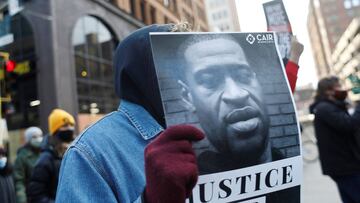Derek Chauvin trial: can he appeal the sentence?
Derek Chauvin was found guilty on all three counts for the killing of George Floyd. Once he is sentenced, he will likely appeal but his chances are slim.

The former Minneapolis police officer Derek Chauvin was convicted for his role in the death of George Floyd while in police custody. He faces up to 40 years in prison should the judge throw the book at him.
Since Chauvin is a first-time offender, it isn’t likely that he would get the maximum sentence, however the prosecution could argue “aggravating factors” to push for longer jail time. Whatever the judge hands down, Chauvin will foreseeably challenge the guilty verdicts he received on the three counts.
- After guilty verdict, what's next for Derek Chauvin?
- Jury begins deliberations after hearing closing arguments in Derek Chauvin trial
- Derek Chauvin pleads the Fifth Amendment
- Derek Chauvin and Tou Thao: who are the two cops in the George Floyd case?
- Derek Chauvin on trial for George Floyd death: what charges were presented?
- How much money did the City of Minneapolis award George Floyd's family?
When will Derek Chauvin appeal his sentence?
Chauvin is due to be sentenced by Judge Peter Cahill, who oversaw the trial, in eight weeks. After he is sentenced, Chauvin will have 90 days to file an appeal of his conviction under Minnesota law. Even though he was found guilty on three counts, all three were for the same crime so sentencing will be based on just one of the counts he was convicted of.
He has been convicted of two counts of murder, second-degree unintentional murder and third-degree murder, and a third count of second-degree manslaughter. Chauvin has no criminal history so he wouldn’t necessarily receive the maximum sentence for the guilty counts against him.
WATCH: The judge reads the guilty verdict in the Derek Chauvin trial in the killing of George Floyd.
— Bloomberg (@business) April 20, 2021
Follow for live coverage ▶️ https://t.co/tAGcC6BMJC pic.twitter.com/ja55DhIi8G
Second-degree murder carries the longest sentence of 40 years in prison, but guidelines in his case call for 12.5 years. The second-degree manslaughter conviction carries a maximum sentence of 10 years but he would most likely be sentenced to four years.
However, the state could cite aggravated factors to ask for stiffer sentencing. They could argue that Chauvin abused his position of authority as a police officer. As well they could cite that the treatment of Floyd was particularly cruel and that the crime happened in the presence of children.
What reasons could Derek Chauvin use to appeal?
There are several reasons that Chauvin could argue to appeal his sentence. His case was extremely high-profile garnering media attention worldwide which he could argue prejudiced the jury before the trial. In addition, the City of Minneapolis settled a $27 million civil lawsuit with George Floyd’s family for his death prior to jury selection, further tainting the minds of the future jurors.
With those considerations he could argue that Judge Cahill’s refusal to move the trial or sequester the jury until deliberations adversely affected the outcome of the trial. Chauvin’s attorney Eric Nelson requested a delay in the trial or a change of venue after the settlement saying it had an “incredible propensity to taint a jury pool." Minnesota defense attorney Brock Hunter told KARE 11 "Overall, I think Judge Cahill put on a good trial and was careful to avoid mistakes that could lead to a successful appeal."
The judge in the Derek Chauvin trial says Rep. Maxine Waters' comments about protests could be grounds for appealing a verdicthttps://t.co/2PDOgvMwRv
— CNN Breaking News (@cnnbrk) April 19, 2021
The words of US Representative Maxine Waters from California, who urged protesters over the weekend to “get more confrontational” if Chauvin was found not guilty, could also be used. Nelson used the comments to request a mistrial which Judge Cahill denied.
What would the chances of success for any appeal by Derek Chauvin?
Related stories
The appeals process is not a retrial and no new evidence will be presented, in many people’s eyes the evidence was overwhelming. Instead the appeal will be based on alleged errors in the trial procedure or how the judge interpreted the law.
Even though Chauvin has a number of ways to appeal his sentence The National Post-Conviction Project, a nonprofit, says that only around 10% of civil and criminal appeals are successful. Paul Applebaum, a Minnesota criminal defense lawyer speaking to ABC News summed it up "Chances are slim to none and slim just left town."


